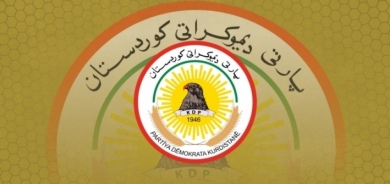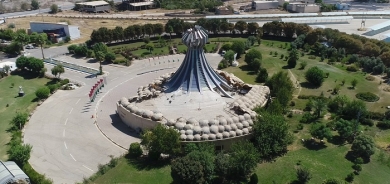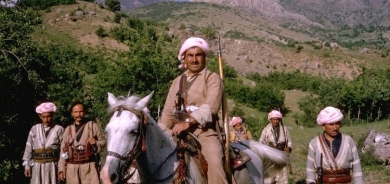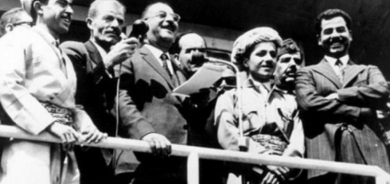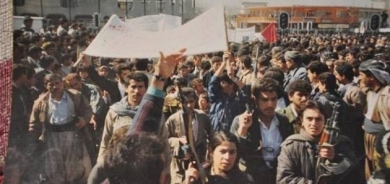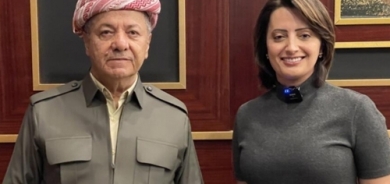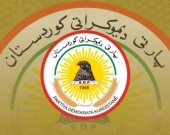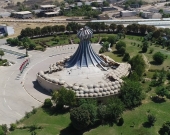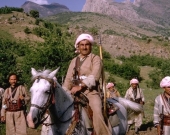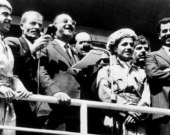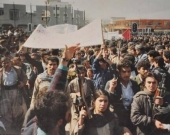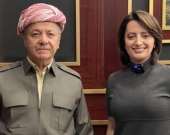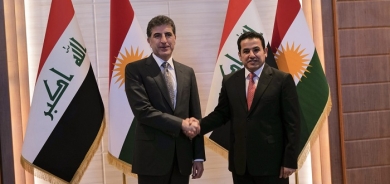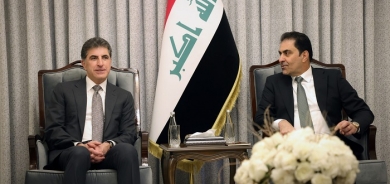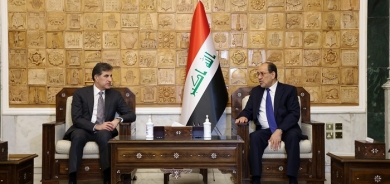If democracy means freedom, self-determination right reflects that freedom

After the fall of Berlin's wall, the term of desired coexistence has undergone changes, which were as a result of the democracy wave that covered Middle and Eastern Europe and created some new countries as a result of separation from the federal states of the "Former Soviet Union republicans, Czech and Slovakia and former Yugoslavia), some experts may refer this to the collapse of former Soviet Union, but the Canadian federalism has always been on the edge of collapse in the past 20 years, voting for remaining or separation of Quebec within Canada doesn't make any difference. So that means it doesn't matter how democratic the state is, but federalism doesn't completely meet the wishes of a nation. If we make a comparison of Kurdistan region as a part of Iraq or the wish of Kurdish people for independency and deciding for self determination cannot even be compared because till now unofficially Kurdish people have voted two times almost 100% would like to take a decision and to have its own independent state, these two times were:
1- After the withdrawal of central government administrational institutions in the spring of 1991, Kurdish people not only could survive the pressure at that time, but also they had very positive response to their leadership that they were ready to accept everything just so as not to become part of Iraq again, the cooperation and positive response of the Kurdish people was the reason for the success of the first Kurdish election in which people participated and voted just like if it was independent day of Kurdistan.
2- After the fall of Saddam Hussein's regime, in the preparations for election in order to rebuild and reorganize Iraq again, an unofficial referendum was held in which again Kurdish people ensured their leadership that they are in favor of having their own state rather than to be part of Iraq again.
These two decisions of the Kurdish people as an ethical ability to comply to the decision of self determination, the Kurdish leadership took the international situation into consideration and preserved the achievements and so as not to be responsible of the division of Iraq, they accepted federalism on the condition that federalism is a self-wanted union of the two main elements of Iraq (Kurd and Arab) and to ensure complete rights to the other minorities as well. But, 8 years is passing on rebuilding Iraq as a federal state, it is not only that Iraq didn't become a federal state, but also it has been through many violent stations including sectarian war and now after the withdrawal of US forces the political process is in a very dangerous situation which has led to the freeze of the coexistence process. The worse is that after 8 years of approving Iraq's constitution which supposed to resolve the problems between KRG and central government, but neither it resolved the problems nor Iraq became a federal state, the most essential problems are disputed territories are implementation of article 140. So in this situation either we should accept all these problems in which because of the internal problems the Iraqi government doesn't want to resolve the suspended problems through the constitutions, or we should seek for an alternative which lays in the decision of Kurdish people.
How bright future comes about?
If we mean by bright future to preserve the freedom and democracy development process, democracy and freedom can happen when it is the reflection of the will of the people, so as we discuss freedom and democracy they mean these priorities of a nation which has sacrificed for them and has resisted disasters and difficult times to achieve them, so democracy and freedom for a nation like Kurdish nation and Kurdistani people means national identity, in which either it should be resolved by a system like Belgium and Canada or through a way or another in which Kurdish people will be able to meet its identity. Humanity has defined democracy and freedom from national identity, so for example if Czech and Slovakia had remained together they wouldn't have been able become member of EU as one state easily, and if Yugoslavia had insisted on remaining as one state, genocide and mass murdering would still have been continuous, even if a forced freedom had been imposed on them, the threats would have been continuous and they wouldn't have been able to provide stability in the Balkan territory, this is so far true for Sudan also, in which it faced an irresolvable problem with its south during the 70s, after decades of wars between armed revolutions and state army, the African countries signed peace agreement between both sides, but last year as we witnessed more than 98% of the people in Southern Sudan voted for independency and got separated. Southern Sudan as a new country may face real difficulties, but Hassan Bashir who used to be recognized as a threat on the area, but now he is changed and deals with the problems in another way, including Darfur. Regarding the aspect of "democracy cannot resolve the identity problems" we contacted the professor James Fearon, a lecturer of political sciences at Stanford University and specialist on ethnic problems in the Middle East, in an exclusive interview with GULAN magazine he responded to our questions as the following: “I think democracy by itself cannot answer the question of who are the people who will form the democratic community, democracy is a method of governing given to a group of people. Democracy by itself doesn't answer the question of who is the group of people who should be governed democratically. This has been a persistent problem, since the 19th century because there isn't really a democratic answer to the question (Who are the set of the people to decide who the set of the people to be ruled by democracy is?). If we ask this question about Iraq? Is federalism in Iraq a cause of continued civil war? As opposed to a unitary state? I would think that trying to get a more centralized state would more likely increase the amount of fighting, not least from the Kurdish areas.
By the way, de facto federalism is possible in non-democracies, when a non-democratic central government recognizes certain rights and prerogatives of regional or other lower-level political units, for the sake of economic growth, political stability, or avoidance of war. Some people say that China is de facto federal, for example".
- The Professor Fearon is closely aware of the ongoing situation of Iraq and he is telling us that the Iraqi government has accepted Kurdistan region as a de facto federal region in Iraq and for this he has mentioned the de facto federalism of China and Taiwan. But the question will be "How long the de facto will has to be?". Taiwan, since 1971, behaves as a country and is member of WTO, but still China is looking for chance to collapse this federalism. Regarding our fact as Kurdish people in Iraq we contacted the Professor Manus I. Midlarsky who’s a lecturer of political sciences at Rutgers University, and he exclusively to GULAN magazine he responded as “Well if you are talking about Kurds, I think it’s a steady movement forward in Kurds national identity. Because in Iraq you have earlier Sulaimania Government, Iran Mahabad, and in Turkey the PKK has been active against the Turkish rule. So there is a sense of cross boarder identity among Kurds and in Iraq it will be much dependent on relations between the Kurdish region and the rest of Iraq itself. If the question is "Will it take place at the moment", Not in the foreseeable future I don’t think, because Iran is not going to be cooperative and Turkey certainly won’t be cooperative and Iraq it depend on what I said depending on the relations between the northern Kurdish region and the rest of Iraq. So not in foreseeable future but I think eventually down the road there is hope for some emerging Kurdish entity across the border relations. So as to achieve this wish you need agreement among three separate states excluding Syria I mean there is also Kurds in Syria but that’s smaller group but among the three largest population of Kurds Turkey, Iraq and Iran there need to be some agreement and right now the way that the region is so difficult".
So both professors, Fearon and Midlarsky, believe that we can reach to our goal through the self-determination right; we have to face some difficulties as internal pressure from Iraq and on the regional level from the neighboring countries. So, the question is that "Will we be able to face these pressures?" the answer is proportional, so if the President of Kurdistan region takes that decision for a bright future, the decision is the wish of Kurdistani people and Kurdish people has the ability to support its president so as to resist the pressures.
Will to respond pressures
If we think that a decision for bright future will face no reaction and no pressure is considering the fact of international policy and current regional policy. But as professor Midlarsky mentioned this step requires attempts on the internal level of Kurdistan region and Iraq, in addition to regional and international ones. Experts on the Kurdish question know that this step needs a common attempt of all aspects in agreements and dialogues on the internal and external levels, but the real factor is the will of Kurdish people and their supporting Kurdish president, so when a similar decision is to be taken, there should be pre-preparations for common understanding and dialogues on the all levels especially on the internal level Kurdish people should be patient. Regarding the self determination right that has faced nations, experts think that one of the problems leading to this decision is that; what is written in the constitution is not implemented on the ground, that is why as elements of diverse states discuss self determination, problems and conflicts come about. Regarding this question, we contacted professor Kyle Clark Beardsley, professor of political sciences at Emory University and in an interview with GULAN magazine he responded as "Any time there is attempt to have a new nation form, it leads to a conflict, whether that is in democracies or non democracies. But the evidences show that once the new nation is formed the nation will be more stable if there is democratic government or democratic process. Regarding formation of Kurdistan, the situation might be more stable if a Kurdish republic were to emerge, I don't think we are in the time period likely to appear, because of the power politics involved, I think that the Kurdish groups in Iraq will have problem to look at the independent state because I think the Americans would fear that this will fracture Iraq that is already fragile, that much money and bloodshed was used in trying to bring stability to Iraq and I think there will be fear that that will bring instability to Iraq but also the Kurdish people in Turkey will have difficulty having any support for them to be part of Kurdistan because of Turkey's role, NATO, European and regional politics, and so I think there you're not going to get the type support that the South Sudanese had to break from Sudan, because I think some of the major powers will resist allowing for a Kurdistan to be formed".
Regarding comparing formation of Kurdistan to South Sudan professor Beardsley responded as " I think I would agree that the formation of South Sudan has reduced tension in Sudan, and I think improved ability for there to be a stable peace in the region, I would say the reason why there wasn't able to a solution be earlier is that there wasn't enough international pressure to be able to hold Sudan's regime accountable, I think there is always suspicion that they may promise something but then defects on their agreement. And what we saw in 2000s that US became much more involved in Sudanese politics to be able to hold the Sunnis regime accountable, then we had ability to reach an agreement, and not just the US but also other Arab states as well as European state really becoming involved in providing resources that holds the Sunni regime accountable and afterward supported the separation of South Sudan, and regarding Israel-Palestine question I think I would agree that the formation of South Sudan has reduced tension in Sudan, and I think improved ability for there to be a stable peace in the region, I would say the reason why there wasn't able to a solution be earlier is that there wasn't enough international pressure to be able to hold Sudan's regime accountable, I think there is always suspicion that they may promise something but then defects on their agreement. And what we saw in 2000s that US became much more involved in Sudanese politics to be able to hold the Sunnis regime accountable, then we had ability to reach an agreement, and not just the US but also other Arab states as well as European state really becoming involved in providing resources that holds the Sunni regime accountable".
- The Professor Beardsley mentioned an important point on the delay of the formation of Palestine state which is due to the lack of Palestinians' having one voice and unity regarding this question, but the more important point that makes a nation to decide for independency is that the dominant nation fails to prove the rights and identity of its nation, then the second nation takes that decision. Regarding this situation we contacted professor Ramses Amer, political sciences lecturer at Opsala University and exclusively to GULAN magazine he responded as" The democracy which is one person one vote means that if you are a multi ethnic society means either coalition of groups together or it means one of them will rule the others. So the problem is that even in the modern democracies you often have a dominant group we have a coalition of groups that’s why for example European countries actually also experience a number of internal rebellions because people feel that the majority group does not respect the minorities the question of course how do you handle this? Do you handle it by peaceful methods democratically or do you handle it violently that policies do not take it to account the aspiration of these minorities and therefore you have seen the wars or you handle them and I think that nowadays it might look like the western Europe is all peaceful but if you look at the 1970 a number of European countries were phasing on rebellion if you look at the Balkans, Yugoslavia very vicious conflict so it’s not easy to say that there is a western European model maybe at a certain period it looks that way but if you look at the longer period of time that might not be necessarily the case. The two state solution has become a very convenient slogan that nothing happened in the Middle East or particularly related to Israel without the good will of US, as you see the US is the closest align and it seems that its Israel who help the US what to do not the other way around then it all depend what Israel what’s to give away and I think that Israel might want the two state solution that’s why controlled everything goes on in all states the other way would of course need to say no let’s have unified Israel Palestine then demographically the Zionist population or the Zionist party will lose because the Palestinian group is growing so fast I think we need to look at this the problem is not really a religious conflict putting Jews against Muslims because if you look at the Palestinian population large majority is Christian and they are not treated better but I think we need to see as political and geostrategic conflict and the problem is no matter how much the international community says that they want two state solution it’s not going to happen until the pressure is put and its not rally the Palestinians who need to be pressured it’s the Israelis. I can tell you I was reading in the foreign policy last week and some political parties say we have to recognize Palestine the foreign minister say what is the use of recognizing someone on the foreign occupation and of course that was ironic because I didn’t know that the US needed to be considered that way. It’s a fact how can actually talk about peace processes we still having the Palestinians in the field of occupation no matter how much they are given up so I don’t really think that the powers that matured actually are to insist on the Palestinian independent state. So two state solution is a nice slogan but it is not really going to happen and I think it in that respect of what is happening in all of the Middle East that changes that are welcome are only welcome as long as they not really threat the major power interests meaning that in Egypt Mubarak getting remark as long as military stays in the power. intervention was welcomed in Libya because the weapon agenda they have to get rid of Kaddafi it didn’t have many friends in the west if you look at the Kurdish situation for generations no one has supported the Kurds independence because they prefer to deal with the Baghdad or Tehran or other countries. so you can see that a population becomes victim because they divided all the boarders you can look at the situation in the northern Iraq where Turkey can do whatever they want seemingly no one is complaining I don’t know how many times Turkey has invaded northern Iraq because they are saying that they are checking guerillas so the Kurdish situation is one of the best examples on how major power geostrategic interest is more important than the rights of a certain population and if you have decided over the modern state it becomes more complicated because the nation state sometimes collaborate to hold you back some other times collaborate with the Kurds of the other country against the government in that country and therefore the situation becomes very complex. So I think the problem is not the aspiration of a population it actually more a matter of configuration of both domestic regional and international factors influencing so its not so easy to say that people want democracy. People want independency also how does the government behave how the neighboring countries behave and how do the major powers behave.”
Translated by: Sheban Ferhad

